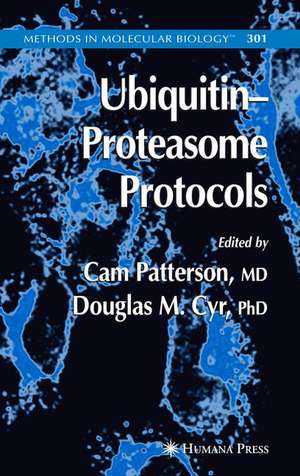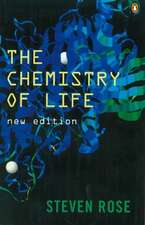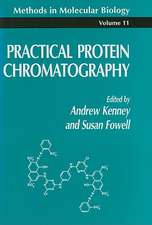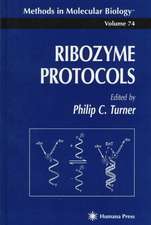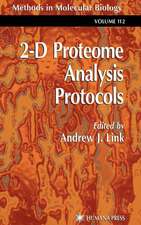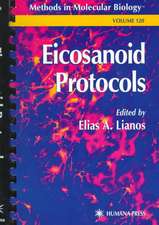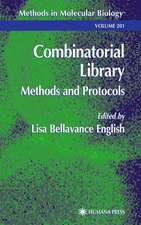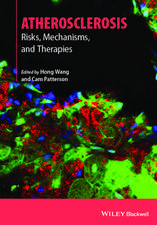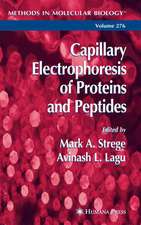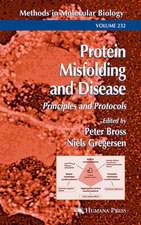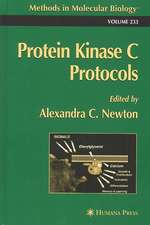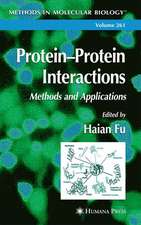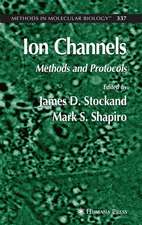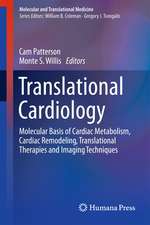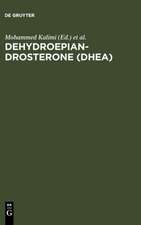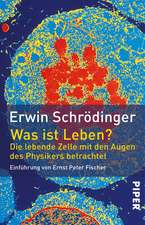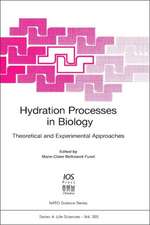Ubiquitin-Proteasome Protocols: Methods in Molecular Biology, cartea 301
Editat de Cam Patterson, Douglas M. Cyren Limba Engleză Hardback – apr 2005
| Toate formatele și edițiile | Preț | Express |
|---|---|---|
| Paperback (1) | 640.70 lei 43-57 zile | |
| Humana Press Inc. – 10 noi 2010 | 640.70 lei 43-57 zile | |
| Hardback (1) | 653.33 lei 43-57 zile | |
| Humana Press Inc. – apr 2005 | 653.33 lei 43-57 zile |
Din seria Methods in Molecular Biology
- 9%
 Preț: 791.59 lei
Preț: 791.59 lei - 23%
 Preț: 598.56 lei
Preț: 598.56 lei - 20%
 Preț: 882.95 lei
Preț: 882.95 lei -
 Preț: 252.04 lei
Preț: 252.04 lei - 5%
 Preț: 802.69 lei
Preț: 802.69 lei - 5%
 Preț: 729.61 lei
Preț: 729.61 lei - 5%
 Preț: 731.43 lei
Preț: 731.43 lei - 5%
 Preț: 741.30 lei
Preț: 741.30 lei - 5%
 Preț: 747.16 lei
Preț: 747.16 lei - 15%
 Preț: 663.45 lei
Preț: 663.45 lei - 18%
 Preț: 1025.34 lei
Preț: 1025.34 lei - 5%
 Preț: 734.57 lei
Preț: 734.57 lei - 18%
 Preț: 914.20 lei
Preț: 914.20 lei - 15%
 Preț: 664.61 lei
Preț: 664.61 lei - 15%
 Preț: 654.12 lei
Preț: 654.12 lei - 18%
 Preț: 1414.74 lei
Preț: 1414.74 lei - 5%
 Preț: 742.60 lei
Preț: 742.60 lei - 20%
 Preț: 821.63 lei
Preț: 821.63 lei - 18%
 Preț: 972.30 lei
Preț: 972.30 lei - 15%
 Preț: 660.49 lei
Preț: 660.49 lei - 5%
 Preț: 738.41 lei
Preț: 738.41 lei - 18%
 Preț: 984.92 lei
Preț: 984.92 lei - 5%
 Preț: 733.29 lei
Preț: 733.29 lei -
 Preț: 392.58 lei
Preț: 392.58 lei - 5%
 Preț: 746.26 lei
Preț: 746.26 lei - 18%
 Preț: 962.66 lei
Preț: 962.66 lei - 23%
 Preț: 860.21 lei
Preț: 860.21 lei - 15%
 Preț: 652.64 lei
Preț: 652.64 lei - 5%
 Preț: 1055.50 lei
Preț: 1055.50 lei - 23%
 Preț: 883.85 lei
Preț: 883.85 lei - 19%
 Preț: 491.88 lei
Preț: 491.88 lei - 5%
 Preț: 1038.84 lei
Preț: 1038.84 lei - 5%
 Preț: 524.15 lei
Preț: 524.15 lei - 18%
 Preț: 2122.34 lei
Preț: 2122.34 lei - 5%
 Preț: 1299.23 lei
Preț: 1299.23 lei - 5%
 Preț: 1339.10 lei
Preț: 1339.10 lei - 18%
 Preț: 1390.26 lei
Preț: 1390.26 lei - 18%
 Preț: 1395.63 lei
Preț: 1395.63 lei - 18%
 Preț: 1129.65 lei
Preț: 1129.65 lei - 18%
 Preț: 1408.26 lei
Preț: 1408.26 lei - 18%
 Preț: 1124.92 lei
Preț: 1124.92 lei - 18%
 Preț: 966.27 lei
Preț: 966.27 lei - 5%
 Preț: 1299.99 lei
Preț: 1299.99 lei - 5%
 Preț: 1108.51 lei
Preț: 1108.51 lei - 5%
 Preț: 983.72 lei
Preț: 983.72 lei - 5%
 Preț: 728.16 lei
Preț: 728.16 lei - 18%
 Preț: 1118.62 lei
Preț: 1118.62 lei - 18%
 Preț: 955.25 lei
Preț: 955.25 lei - 5%
 Preț: 1035.60 lei
Preț: 1035.60 lei - 18%
 Preț: 1400.35 lei
Preț: 1400.35 lei
Preț: 653.33 lei
Preț vechi: 768.62 lei
-15% Nou
Puncte Express: 980
Preț estimativ în valută:
125.01€ • 130.88$ • 103.44£
125.01€ • 130.88$ • 103.44£
Carte tipărită la comandă
Livrare economică 07-21 aprilie
Preluare comenzi: 021 569.72.76
Specificații
ISBN-13: 9781588292520
ISBN-10: 1588292525
Pagini: 381
Ilustrații: XII, 381 p. 172 illus.
Dimensiuni: 155 x 235 x 26 mm
Greutate: 0.78 kg
Ediția:2005
Editura: Humana Press Inc.
Colecția Humana
Seria Methods in Molecular Biology
Locul publicării:Totowa, NJ, United States
ISBN-10: 1588292525
Pagini: 381
Ilustrații: XII, 381 p. 172 illus.
Dimensiuni: 155 x 235 x 26 mm
Greutate: 0.78 kg
Ediția:2005
Editura: Humana Press Inc.
Colecția Humana
Seria Methods in Molecular Biology
Locul publicării:Totowa, NJ, United States
Public țintă
ResearchCuprins
Biochemical Methods to Study the Ubiquitin-Proteasome System.- Small-Molecule Inhibitors of Proteasome Activity.- Purification of E1 and E1-Like Enzymes.- Assays for RING Family Ubiquitin Ligases.- Ubiquitin Chain Synthesis.- Purification of Proteasomes, Proteasome Subcomplexes, and Proteasome-Associated Proteins From Budding Yeast.- Recognition and Processing of Misfolded Proteins by PA700, the 19S Regulatory Complex of the 26S Proteasome.- Cell-Free Assay for Ubiquitin-Independent Proteasomal Protein Degradation.- Assays of Proteasome-Dependent Cleavage Products.- Identification of Components of Protein Complexes.- Mass Spectrometric Determination of Protein Ubiquitination.- Reconstitution of Endoplasmic Reticulum-Associated Degradation Using Yeast Membranes and Cytosol.- Reticulocyte Lysate as a Model System to Study Endoplasmic Reticulum Membrane Protein Degradation.- Deubiquitinating Enzyme Purification, Assay Inhibitors, and Characterization.- Cellular Methods to Study Ubiquitin-Proteasome-Dependent Functions.- Measuring Ubiquitin Conjugation in Cells.- Assays for Proteasome Assembly and Maturation.- N-Terminal Ubiquitination.- Quantitating Defective Ribosome Products.- Endoplasmic Reticulum-Associated Protein Quality Control and Degradation.- Endoplasmic Reticulum-Associated Protein Quality Control and Degradation.- Cystic Fibrosis Transmembrane Conductance Regulator as a Model Substrate to Study Endoplasmic Reticulum Protein Quality Control in Mammalian Cells.- Aggresome Formation.- Detection of Sumoylated Proteins.- Proteasome Inhibitors in Cancer Therapy.- Parkinson’s Disease.
Recenzii
"...clearly written and thorough...a valuable addition to any lab entering, or already working in, the ubiquitin or proteasome field." - Doody's Health Science Book Review Journal
Textul de pe ultima copertă
The targeted addition of ubiquitin to proteins is now known to regulate many cellular events, with the enzymes involved in protein ubiquitination linked to a variety of clinical problems, such as cancer, heart disease, and immune dysfunction. In Ubiquitin-Proteasome Protocols, hands-on leaders in the field, many of whom originally developed the methods they describe, detail cutting-edge techniques for studying ubiquitin-dependent protein degradation via the proteasome. The topics covered range broadly from basic biochemistry to cellular assays to discovery techniques using mass spectrometric analysis. These biochemical and cellular methods are necessary to explore the ubiquitin-proteasome system and ubiquitin-proteasome- dependent functions. The protocols follow the successful Methods in Molecular Biology™ series format, each offering step-by-step laboratory instructions, an introduction outlining the principle behind the technique, lists of the necessary equipment and reagents, and tips on troubleshooting and avoiding known pitfalls.
State-of-the-art and user-friendly, Ubiquitin-Proteasome Protocols offers novice and experienced bench scientists alike a thorough compendium of readily reproducible techniques that will accelerate discovery, enhance productivity, and permit manipulation of the system for varied research purposes.
State-of-the-art and user-friendly, Ubiquitin-Proteasome Protocols offers novice and experienced bench scientists alike a thorough compendium of readily reproducible techniques that will accelerate discovery, enhance productivity, and permit manipulation of the system for varied research purposes.
Caracteristici
Includes supplementary material: sn.pub/extras
